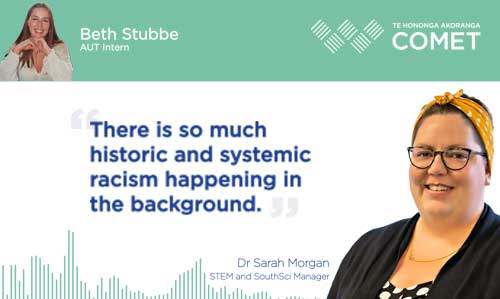
Q&A soundbite
Q&A with SouthSci Manager Sarah Morgan about STEM, racism & quotas - by Beth Stubbe, AUT Intern
1) Māori and Pasifika are underrepresented in STEM subjects, some claim that this is because the ‘science pipeline’ is broken. What do you think of this?
It's not just broken, it's inherently racist all the way through. The STEM pipeline begins with school, and the problem is that there are different expectations for students of different ethnicities. And so some teachers have lower expectations for Māori and Pasifika students, and it's not always conscious. I think a lot of it is subconscious but it's something that can only be fixed when it's proactively and consciously recognised. It is very easy to happen if you're not vigilant about making sure it doesn't. One teacher with low expectations for a student can have a huge impact on the life of that kid.
2) Do you think young Māori and Pasifika students are being discouraged from STEM subjects as early as primary school age? What is SouthSci doing to help?
So I think it's important to recognise that it's not necessarily active discouragement, it can be quite subliminal. And it's a culmination of factors from teachers to whānau to community, it's bigger than like one specific overt thing. What SouthSci does is it takes the subject that is considered to be ‘not fun’ or ‘not interesting’, and engages kids in a community project that they care about.
For example, right now we have kids learning about the storm water and sewage overflows into Ōtara Creek. This provides a really great context because if you live in a house that looks over the creek, you can see that there's no birds on it, it looks disgusting, and you can't play or swim in it. This is a project that is offering a chance to learn more about it and help to clean it. And, you know, potentially, we could clean it up and you could jump on a kayak and catch some fish for dinner, obviously, that’s quite far away.
It's so locally relevant, you can see why it's important and the tangible outcomes. So the SouthSci projects take local things and make them kind of real, and really hands on for kids.
3) I’m sure you are aware of the issues around ‘desirable diversity’; where Māori and Pasifika students are equally represented in photos and on the surface level, with no real change occurring in reality. Do you think this is a step in the right direction or an inhibitor to change?
I think one is linked to the other, like, if you see the marketing materials for a course at a university, and you see it's only white boys pictured, if you're anything other than that, you're highly unlikely to consider that a space where you might fit in.
I think the marketing aspect is important because being able to see yourself in a particular career pathway or study pathway is really important when you're deciding what you want to do, and so having representation in media is really important.
For a tertiary institution, that is trying to reach a better kind of diversity, you can’t put all of your money and effort into marketing and taking pretty photos without doing any of the other mahi. That is really disingenuous in it's not going to have good outcomes.
4) Do you agree that Universities need quotas to ensure some more Māori and Pasifika students are engaged in STEM studies? Why are they so important? What do you say to those who are dismissive or discriminatory to people coming through such programmes?
I think there's a lot of misunderstanding about the programmes themselves, people assume that kids are getting in on low marks, which is very often absolutely not true. It's just that places are reserved for kids of a certain background and it doesn't mean that they're less able to do the course
It's also really important to recognise too, that it's not just addressing the disparity in like representation and profession, it's also addressing the fact that a lot of these kids actually have a lot of things stacked against them in all of their learning up to that point. There's so much like historic and systemic racism happening in the background. It's not just about evening out the profession, it’s about addressing all of that stuff, too.
I’m a big fan of radical change, so how about we restrict limited entry courses of all kinds to under-represented minorities until the professions are showing proportional equity in representation!